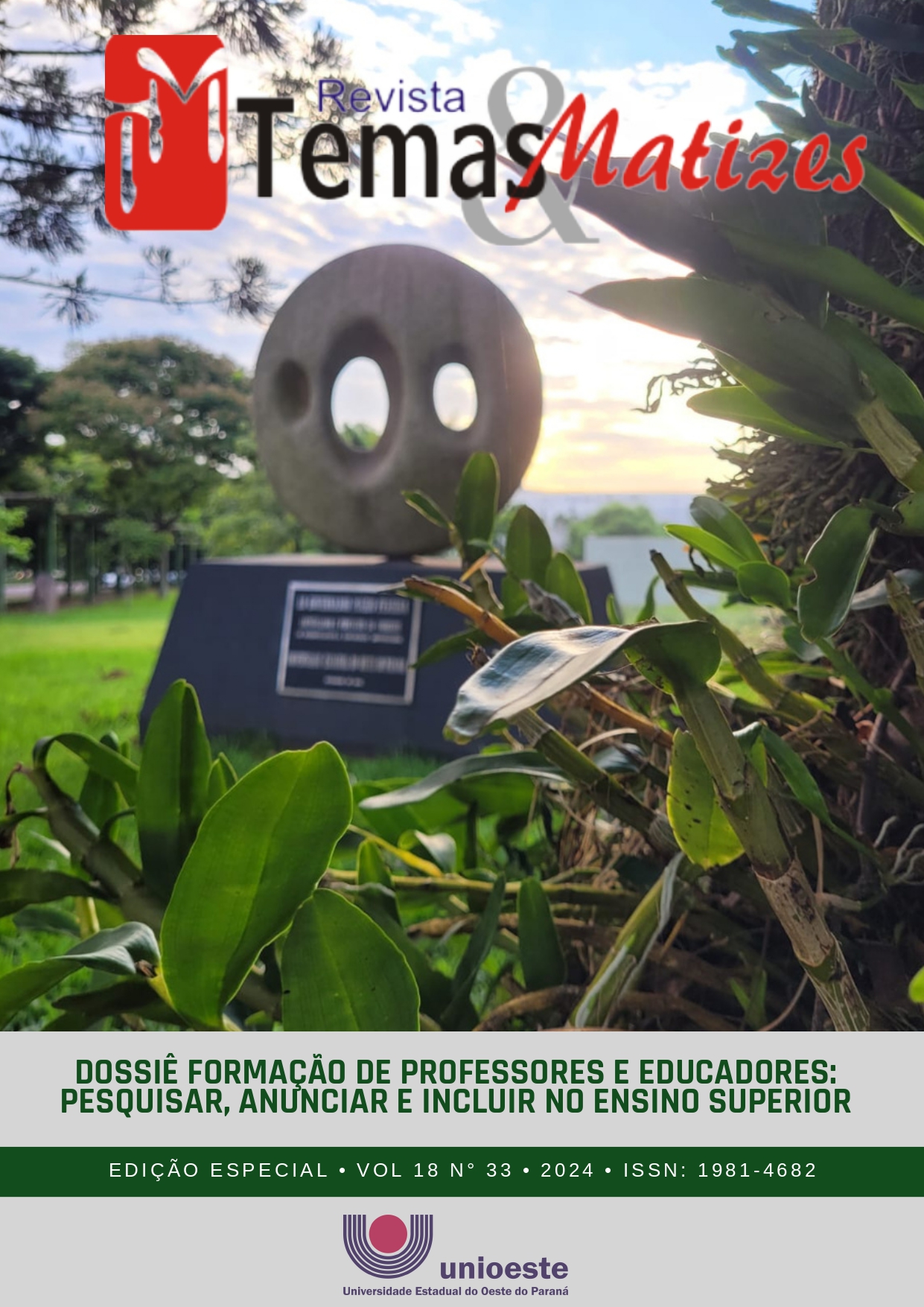Retalhos de si: o testemunho ético do ser professor
DOI:
https://doi.org/10.48075/rtm.v18i33.33332Keywords:
Aesthetic ethics. Eacher training. Professional practice.Abstract
The present work aims to know and reflect on the ethics of being a teacher from an “ethical aesthetic experience” (HERMANN, 2010) with the members of the Research Group on Emotional Education. The motivation for this research began with the study of the chapter “Ethics and professional practice” by the author Isabel Baptista (2005) Taunting questions related to the exercise of teaching and the meaning of the profession that leads us to problematize our ethical choices throughout training teacher. Thus, through a qualitative approach, bricolage productions were analyzed as an aesthetic representation of the ethics of being a teacher expressed in professional practice, an aesthetic-reflective exercise experienced at group in the light of studies on the ethical-deontological status of the teaching profession developed by Baptista (2005). The production enabled the mobilization of memories, images, colors, feelings, emotions articulated in the construction of this continuous formative path (NÓVOA, 1999) and constitutive of the teaching professional practice expressed in bricolage. We conclude that being in the teaching profession does not exist without the individual and collective commitment to training, understood as a continuous process of professional development in an ethical aesthetic movement (FREIRE, 2011; BAPTISTA, 2005) which mobilizes reflection on ethics with oneself and the other, values, conducts, beliefs, rites and rhythms of the professional trajectory of each one.
References
BAPTISTA, I. Dar rosto ao futuro: a educação como compromisso ético. Porto, Portugal: PROFEDIÇÕES, 2005.
FARIAS, J. M. de; OURIQUE, M. L. H. A tinta, o tempo e as credenciais de formação humana para a docência. In: Debates em Educação. Vol.15, nº37, Maceió, 2023. Disponível em: https://www.seer.ufal.br/index.php/debateseducacao/article/view/15007 . Acesso em: 22 de agosto de 2023.
FERRY, G. Pedagogia de la formación. Buenos Aires: Centro de Publicaciones Educativas y Material Didáctico, 2004.
FREIRE, P. Política e educação: ensaios. 7 ed. Editora Cortez, 2003.
_______. Pedagogia da autonomia: saberes necessários à prática educativa. 35. ed. São Paulo, SP: Paz e Terra, 2011.
HERMANN, N. Autocriação e horizonte comum: ensaios sobre a educação ético-estética. Ijuí: Ed. Unijuí, 2010.
_______. Ética e estética: a relação quase esquecida. Porto Alegre, RS: Edipucrs, 2005.
LAVILLE, C.; DIONNE, J. A Construção do Saber - Manual de Metodologia da Pesquisa em Ciências da Educação. Porto Alegre: Artmed Editográfica, 1999.
LESSARD-HÉBERT, M.; GOYETTE, G.; BOUTIN, G. Investigação Qualitativa - Fundamentos e Práticas. 2.ª ed. Lisboa: Edições Piaget, 2005.
MARQUES, M. O. Escrever é preciso: o princípio da pesquisa. 5. ed.rev. Ijuí: Ed. Unijuí, 2006.
NÓVOA, A. O passado e o presente dos professores. In. Nóvoa, A.(org.) Profissão professor. 2. ed. Portugal: Porto Editora, 1999. p. 03-34.
_______. Os professores e a sua formação. 2 ed. Portugal: Dom Quixote, 1995.
Downloads
Published
How to Cite
Issue
Section
License

This work is licensed under a Creative Commons Attribution-NonCommercial-ShareAlike 4.0 International License.
Aviso de Direito Autoral Creative Commons
Política para Periódicos de Acesso Livre
Autores que publicam nesta revista concordam com os seguintes termos:
1. Autores mantém os direitos autorais e concedem à revista o direito de primeira publicação, com o trabalho simultaneamente licenciado sob a Licença Creative Commons Attribution que permite o compartilhamento do trabalho com reconhecimento da autoria e publicação inicial nesta revista.2. Autores têm autorização para assumir contratos adicionais separadamente, para distribuição não-exclusiva da versão do trabalho publicada nesta revista (ex.: publicar em repositório institucional ou como capítulo de livro), com reconhecimento de autoria e publicação inicial nesta revista.
3. Autores têm permissão e são estimulados a publicar e distribuir seu trabalho online (ex.: em repositórios institucionais ou na sua página pessoal) a qualquer ponto antes ou durante o processo editorial, já que isso pode gerar alterações produtivas, bem como aumentar o impacto e a citação do trabalho publicado (Veja O Efeito do Acesso Livre).
Licença Creative Commons
Esta obra está licenciada com uma Licença Creative Commons Atribuição-NãoComercial-CompartilhaIgual 4.0 Internacional, o que permite compartilhar, copiar, distribuir, exibir, reproduzir, a totalidade ou partes desde que não tenha objetivo comercial e sejam citados os autores e a fonte.


